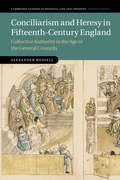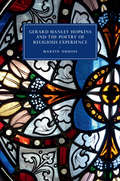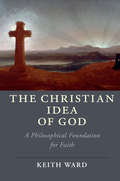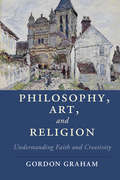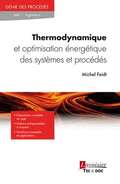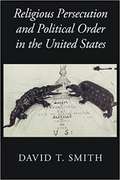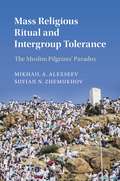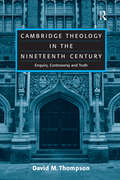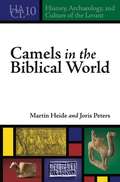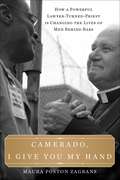- Table View
- List View
Cambridge Studies in Islamic Civilization: Gender Hierarchy in the Qurʾān
by Karen BauerThis book explores how medieval and modern Muslim religious scholars ('ulamā') interpret gender roles in Qur'ānic verses on legal testimony, marriage, and human creation. Citing these verses, medieval scholars developed increasingly complex laws and interpretations upholding a male-dominated gender hierarchy; aspects of their interpretations influence religious norms and state laws in Muslim-majority countries today, yet other aspects have been discarded entirely. Karen Bauer traces the evolution of their interpretations, showing how they have been adopted, adapted, rejected, or replaced over time, by comparing the Qur'ān with a wide range of Qur'ānic commentaries and interviews with prominent religious scholars from Iran and Syria. At times, tradition is modified in unexpected ways: learned women argue against gender equality, or Grand Ayatollahs reject sayings of the Prophet, citing science instead. This innovative and engaging study highlights the effects of social and intellectual contexts on the formation of tradition, and on modern responses to it.
Cambridge Studies in Islamic Civilization: Sexual Violation in Islamic Law
by Hina AzamThis book provides a detailed analysis of Islamic juristic writings on the topic of rape and argues that classical Islamic jurisprudence contained nuanced, substantially divergent doctrines of sexual violation as a punishable crime. The work centers on legal discourses of the first six centuries of Islam, the period during which these discourses reached their classical forms, and chronicles the juristic conflict over whether or not to provide monetary compensation to victims. Along with tracing the emergence and development of this conflict over time, Hina Azam explains evidentiary ramifications of each of the two competing positions, which are examined through debates between the Ḥanafī and Mālikī schools of law. This study examines several critical themes in Islamic law, such as the relationship between sexuality and property, the tension between divine rights and personal rights in sex crimes, and justifications of victim's rights afforded by the two competing doctrines.
Cambridge Studies in Islamic Civilization: The Economics of Ottoman Justice
by Metin Coşgel Boğaç ErgeneDuring the seventeenth and eighteenth centuries, the Ottoman Empire endured long periods of warfare, facing intense financial pressures and new international mercantile and monetary trends. The Empire also experienced major political-administrative restructuring and socioeconomic transformations. In the context of this tumultuous change, The Economics of Ottoman Justice examines Ottoman legal practices and the sharia court's operations to reflect on the judicial system and provincial relationships. Metin Coşgel and Boğa#65533; Ergene provide a systematic depiction of socio-legal interactions, identifying how different social, economic, gender and religious groups used the court, how they settled their disputes, and which factors contributed to their success at trial. Using an economic approach, Coşgel and Ergene offer rare insights into the role of power differences in judicial interactions, and into the reproduction of communal hierarchies in court, and demonstrate how court use patterns changed over time.
Cambridge Studies in Law and Society: China and Islam
by Matthew S. ErieChina and Islam examines the intersection of two critical issues of the contemporary world: Islamic revival and an assertive China, questioning the assumption that Islamic law is incompatible with state law. It finds that both Hui and the Party-State invoke, interpret, and make arguments based on Islamic law, a minjian (unofficial) law in China, to pursue their respective visions of 'the good'. Based on fieldwork in Linxia, 'China's Little Mecca', this study follows Hui clerics, youthful translators on the 'New Silk Road', female educators who reform traditional madrasas, and Party cadres as they reconcile Islamic and socialist laws in the course of the everyday. The first study of Islamic law in China and one of the first ethnographic accounts of law in postsocialist China, China and Islam unsettles unidimensional perceptions of extremist Islam and authoritarian China through Hui minjian practices of law.
Cambridge Studies in Medieval Life and Thought: Bishops, Authority and Community in Northwestern Europe, c. 1050–1150
by Ott John S.This important new study of episcopal office and clerical identity in a socially and culturally dynamic region of medieval Europe examines the construction and representation of episcopal power and authority in the archdiocese of Reims during the sometimes turbulent century between 1050 and 1150. Drawing on a wide range of diplomatic, hagiographical, epistolary and other narrative sources, John S. Ott considers how bishops conceived of, and projected, their authority collectively and individually. In examining episcopal professional identities and notions of office, he explores how prelates used textual production and their physical landscapes to craft historical narratives and consolidate local and regional memories around ideals that established themselves as not only religious authorities but also cultural arbiters. This study reveals that, far from being reactive and hostile to cultural and religious change, bishops regularly grappled with and sought to affect, positively and to their advantage, new and emerging cultural and religious norms.
Cambridge Studies in Medieval Life and Thought: Collective Authority in the Age of the General Councils (Cambridge Studies in Medieval Life and Thought: Fourth Series)
by Alexander RussellThe general councils of the fifteenth century constituted a remarkable political experiment, which used collective decision-making to tackle important problems facing the church. Such problems had hitherto received rigid top-down management from Rome. However, at Constance and Basle, they were debated by delegates of different ranks from across Europe and resolved through majority voting. Fusing the history of political thought with the study of institutional practices, this innovative study relates the procedural innovations of the general councils and their anti-heretical activities to wider trends in corporate politics, intellectual culture and pastoral reform. Alexander Russell argues that the acceptance of collective decision-making at the councils was predicated upon the prevalence of group participation and deliberation in small-scale corporate culture. Conciliarism and Heresy in Fifteenth-Century England offers a fundamental reassessment of England's relationship with the general councils, revealing how political thought, heresy, and collective politics were connected.
Cambridge Studies in Medieval Life and Thought: History, Frankish Identity and the Framing of Western Ethnicity, 550–850
by Helmut ReimitzThis pioneering study explores early medieval Frankish identity as a window into the formation of a distinct Western conception of ethnicity. Focusing on the turbulent and varied history of Frankish identity in Merovingian and Carolingian historiography, it offers a new basis for comparing the history of collective and ethnic identity in the Christian West with other contexts, especially the Islamic and Byzantine worlds. The tremendous political success of the Frankish kingdoms provided the medieval West with fundamental political, religious and social structures, including a change from the Roman perspective on ethnicity as the quality of the 'Other' to the Carolingian perception that a variety of Christian peoples were chosen by God to reign over the former Roman provinces. Interpreting identity as an open ended process, Helmut Reimitz explores the role of Frankish identity in the multiple efforts through which societies tried to find order in the rapidly changing post-Roman world.
Cambridge Studies in Nineteenth-Century Literature and Culture: Gerard Manley Hopkins and the Poetry of Religious Experience (Cambridge Studies in Nineteenth-Century Literature and Culture #108)
by Martin DuboisThis nuanced yet accessible study is the first to examine the range of religious experience imagined in Hopkins's writing. By exploring the shifting way in which Hopkins imagines religious belief in individual history, Martin Dubois contests established views of his poetry as a unified project. Combining detailed close readings with extensive historical research, Dubois argues that the spiritual awareness manifest in Hopkins's poetry is varied and fluctuating, and that this is less a failure of his intellectual system than a sign of the experiential character of much of his poetry's thought. Individual chapters focus on biblical language and prayer, as well as on the spiritual ideal seen in the figures of the soldier and the martyr, and on Hopkins's ideas of death, judgement, heaven and hell. Offering fresh interpretations of the major poems, this volume reveals a more diverse and exploratory poet than has been recognised.
Cambridge Studies in Religion, Philosophy, and Society: A Philosophical Foundation for Faith (Cambridge Studies in Religion, Philosophy, and Society)
by Keith WardIn this book, eminent theologian Keith Ward takes a fresh look at the ancient philosophy of Idealism, connects it with findings in modern science, and shows that a combination of good science, good philosophy, and a passion for truth and goodness, can underpin religious faith. Going back to first principles, he argues for the Idealist view that all knowledge begins with experience. Critically examining the idealism of Plato, Kant, and Hegel, Ward shows how this philosophy is strengthened by a knowledge of modern physics, and how it can lead to a new and vivid presentation of Christian faith. A work of philosophical rigour that makes clear the rational nature of belief in God, this book challenges the easy assumptions of materialism and the relativity of truth that undermine both science and religion. Ward writes in an accessible and readable style that gives new life and practical usefulness to idealist philosophy.
Cambridge Studies in Religion, Philosophy, and Society: Ethics and Religion
by Harry J. GenslerMany people question whether God is the source of morality. Under divine command theory, God's will creates the moral order, and therefore ethical truths are true because of God's will. Under natural law, on the other hand, some ethical truths do not depend on God's will, and yet perhaps they depend on his reason or creation. Ethics and Religion develops strong, defensible, and original versions of both divine command theory and natural law. The book also discusses ethics and atheism: how atheists object on ethical grounds to belief in God and how they view ethics. The book defends belief in God from criticisms and analyzes related concepts, such as practical reason, the golden rule, ethics and evolution, the problem of evil, and the fine-tuning argument.
Cambridge Studies in Religion, Philosophy, and Society: Psychology, Religion, and Spirituality
by Fraser WattsPsychology, Religion, and Spirituality provides readers with a critical overview of what psychology tells us about religion and spirituality. It is concise without being simplistic, and the first such broad overview to be published for some years. Fraser Watts recognizes that 'religion' is complex and multi-faceted, taking different forms in different people and contexts. The book presents a broad view of psychology; whatever kind of psychology you are interested in, you will find it covered here, from biological to social, and from experimental to psychoanalytic. It focuses particularly on the varied concepts that psychologists have employed to make sense of religion and subjects them to critical examination. The book is also concerned with practical applications, helping those engaged in religious ministry. It will be of interest to undergraduates and general readers, as well as specialists in religious studies, psychology, and philosophy of religion.
Cambridge Studies in Religion, Philosophy, and Society: Reason, Revelation, and Devotion
by William J. WainwrightReason, Revelation, and Devotion argues that immersion in religious reading traditions and their associated spiritual practices significantly shapes our emotions, desires, intuitions, and volitional commitments; these in turn affect our construction and assessments of arguments for religious conclusions. But far from distorting the reasoning process, these emotions and volitional and cognitive dispositions can be essential for sound reasoning on religious and other value-laden subject matters. And so western philosophy must rethink its traditional antagonism toward rhetoric. The book concludes with discussions of the implications of the earlier chapters for the relation between reason and revelation, and for the role that the concept of mystery should play in philosophy in general, and in the philosophy of religion and philosophical theology in particular.
Cambridge Studies in Religion, Philosophy, and Society: Understanding Faith and Creativity (Cambridge Studies in Religion, Philosophy, and Society)
by Gordon GrahamAt a time when religion and science are thought to be at loggerheads, art is widely hailed as religion's natural spiritual ally. Philosophy, Art, and Religion investigates the extent to which this is true. It charts the way in which modern conceptions of 'Art' often marginalize the sacred arts, construing choral and instrumental music, painting and iconography, poetry, drama, and architecture as 'applied' arts that necessarily fall short of the ideal of 'art for art's sake'. Drawing on both history of art and philosophical aesthetics, Graham sets out the historical context in which the arts came to free themselves from religious patronage, in order to conceptualize the cultural context in which religious art currently finds itself. The book then relocates religious art within the aesthetics of everyday life. Subsequent chapters systematically explore each of the sacred arts, using a wide range of illustrative examples to uncover the ways in which artworks can illuminate religious faith, and religious content can lend artworks a deeper dimension.
Cambridge Studies in Social Theory, Religion and Politics: Islam and Democracy in Indonesia
by Jeremy MenchikIndonesia's Islamic organizations sustain the country's thriving civil society, democracy, and reputation for tolerance amid diversity. Yet scholars poorly understand how these organizations envision the accommodation of religious difference. What does tolerance mean to the world's largest Islamic organizations? What are the implications for democracy in Indonesia and the broader Muslim world? Jeremy Menchik argues that answering these questions requires decoupling tolerance from liberalism and investigating the historical and political conditions that engender democratic values. Drawing on archival documents, ethnographic observation, comparative political theory, and an original survey, Islam and Democracy in Indonesia demonstrates that Indonesia's Muslim leaders favor a democracy in which individual rights and group-differentiated rights converge within a system of legal pluralism, a vision at odds with American-style secular government but common in Africa, Asia and Eastern Europe.
Cambridge Studies in Social Theory, Religion and Politics: Secular Conversions
by Damon MayrlWhy does secularization proceed differently in otherwise similar countries? Secular Conversions demonstrates that the institutional structure of the state is a key factor shaping the course of secularization. Drawing upon detailed historical analysis of religious education policy in the United States and Australia, Damon Mayrl details how administrative structures, legal procedures, and electoral systems have shaped political opportunities and even helped create constituencies for secular policies. In so doing, he also shows how a decentralized, readily accessible American state acts as an engine for religious conflict, encouraging religious differences to spill into law and politics at every turn. This book provides a vivid picture of how political conflicts interacted with the state over the long span of American and Australian history to shape religion's role in public life. Ultimately, it reveals that taken-for-granted political structures have powerfully shaped the fate of religion in modern societies.
Cambridge Studies in Social Theory, Religion, and Politics: Godless Democrats and Pious Republicans?
by Ryan L. ClaassenDo Evangelical activists control the Republican Party? Do secular activists control the Democratic Party? In Godless Democrats and Pious Republicans?, Ryan Claassen carefully assesses the way campaign activists represent religious and non-religious groups in American political parties dating back to the 1960s. By providing a new theoretical framework for investigating the connections between macro social and political trends, the results challenge a conventional wisdom in which recently mobilized religious and Secular extremists captured the parties and created a God gap. The new approach reveals that very basic social and demographic trends matter far more than previously recognized and that mobilization matters far less. The God gap in voting is real, but it was not created by Christian Right mobilization efforts and a Secular backlash. Where others see culture wars and captured parties, Claassen finds many religious divisions in American politics are artifacts of basic social changes. This very basic insight leads to many profoundly different conclusions about the motivations of religious and non-religious activists and voters.
Cambridge Studies in Social Theory, Religion, and Politics: Political Secularism, Religion, and the State
by Jonathan FoxThis book examines 111 types of state religion policy in 177 countries between 1990 and 2008. Jonathan Fox argues that policy is largely a result of the competition between political secular actors and religious actors, both of which try to influence state religion policy. While there are other factors that influence state religion policy and both the secular and religious camps are divided, Fox offers that the secular-religious competition perspective provides critical insight into the nature of religious politics across the globe. While many states have both increased and decreased their involvement in religion, Fox demonstrates that states which have become more involved in religion are far more common.
Cambridge Studies in Social Theory, Religion, and Politics: Politics of Desecularization
by Sadia SaeedThe movement away from secularist practices and toward political Islam is a prominent trend across Muslim polities. Yet this shift remains under-theorized. Why do modern Muslim polities adopt policies that explicitly cater to religious sensibilities? How are these encoded in law and with what effects? Sadia Saeed addresses these questions through examining shifts in Pakistan's official state policies toward the rights of religious minorities, in particular the controversial Ahmadiyya community. Looking closely at the 'Ahmadi question', Saeed develops a framework for conceptualizing and explaining modern desecularization processes that emphasizes the critical role of nation-state formation, political majoritarianism, and struggles between 'secularist' and 'religious' ideologues in evolving political and legal fields. The book demonstrates that desecularization entails instituting new understandings of religion through processes and justifications that are quintessentially modern.
Cambridge Studies in Social Theory, Religion, and Politics: Religious Persecution and Political Order in the United States
by David T. SmithReligious freedom is a foundational value of the United States, but not all religious minorities have been shielded from religious persecution in America. This book examines why the state has acted to protect some religious minorities while allowing others to be persecuted or actively persecuting them. It details the persecution experiences of Mormons, Jehovah's Witnesses, Catholics, Jews, the Nation of Islam, and orthodox Muslims in America, developing a theory for why the state intervened to protect some but not others. The book argues that the state will persecute religious minorities if state actors consider them a threat to political order, but they will protect religious minorities if they believe persecution is a greater threat to political order. From the beginning of the republic to after 9/11, religious freedom in America has depended on the state's perception of political threats.
Cambridge Studies in Social Theory, Religion, and Politics: The Muslim Pilgrims' Paradox (Cambridge Studies in Social Theory, Religion and Politics)
by Alexseev Mikhail A. Zhemukhov Sufian N.Under what conditions does in-group pride facilitate out-group tolerance? What are the causal linkages between intergroup tolerance and socialization in religious rituals? This book examines how Muslims from Russia's North Caucuses returned from the Hajj pilgrimage to Mecca both more devout as Muslims and more tolerant of out-groups. Drawing on prominent theories of identity and social capital, the authors resolve seeming contradictions between the two literatures by showing the effects of religious rituals that highlight within-group diversity at the same time that they affirm the group's common identity. This theory is then applied to explain why social integration of Muslim immigrants has been more successful in the USA than in Europe and how the largest Hispanic association in the US defied the clash of civilizations theory by promoting immigrants' integration into America's social mainstream. The book offers insights into Islam's role in society and politics and the interrelationships between religious faith, immigration and ethnic identity, and tolerance that will be relevant to both scholars and practitioners.
Cambridge Studies on the American South: Religion, Community, and Slavery on the Colonial Southern Frontier
by Melton, James Van HornThis book tells the story of Ebenezer, a frontier community in colonial Georgia founded by a mountain community fleeing religious persecution in its native Salzburg. This study traces the lives of the settlers from the alpine world they left behind to their struggle for survival on the southern frontier of British America. Exploring their encounters with African and indigenous peoples with whom they had had no previous contact, this book examines their initial opposition to slavery and why they ultimately embraced it. Transatlantic in scope, this study will interest readers of European and American history alike.
Cambridge Theology in the Nineteenth Century: Enquiry, Controversy and Truth
by David M. ThompsonMany books have been written about nineteenth-century Oxford theology, but what was happening in Cambridge? This book provides the first continuous account of what might be called 'the Cambridge theological tradition', by discussing its leading figures from Richard Watson and William Paley, through Herbert Marsh and Julius Hare, to the trio of Lightfoot, Westcott and Hort. It also includes a chapter on nonconformists such as Robertson Smith, P.T. Forsyth and T.R. Glover. The analysis is organised around the defences that were offered for the credibility of Christianity in response to hostile and friendly critics. In this period the study of theology was not yet divided into its modern self-contained areas. A critical approach to scripture was taken for granted, and its implications for ecclesiology, the understanding of salvation and the social implications of the Gospel were teased out (in Hort's phrase) through enquiry and controversy as a way to discover truth. Cambridge both engaged with German theology and responded positively to the nineteenth-century 'crisis of faith'.
Camels in the Biblical World (History, Archaeology, and Culture of the Levant #10)
by Martin Heide Joris PetersCamels are first mentioned in the Bible as the movable property of Abraham. During the early monarchy, they feature prominently as long-distance mounts for the Queen of Sheba, and almost a millennium later, the Gospels tell us about the impossibility of a camel passing through a needle’s eye. Given the limited extrabiblical evidence for camels before circa 1000 BCE, a thorough investigation of the spatio-temporal history of the camel in the ancient Near and Middle East is necessary to understand their early appearance in the Hebrew Bible.Camels in the Biblical World is a two-part study that charts the cultural trajectories of two domestic species—the two-humped or Bactrian camel (Camelus bactrianus) and the one-humped or Arabian camel (Camelus dromedarius)—from the fourth through first millennium BCE and up to the first century CE. Drawing on archaeological camel remains, iconography, inscriptions, and other text sources, the first part reappraises the published data on the species’ domestication and early exploitation in their respective regions of origin. The second part takes a critical look at the various references to camels in the Hebrew Bible and the Gospels, providing a detailed philological analysis of each text and referring to archaeological data and zoological observations whenever appropriate. A state-of-the-art evaluation of the cultural history of the camel and its role in the biblical world, this volume brings the humanities into dialogue with the natural sciences. The novel insights here serve scholars in disciplines as diverse as biblical studies, (zoo)archaeology, history, and philology.
Camels in the Biblical World (History, Archaeology, and Culture of the Levant)
by Martin Heide Joris PetersCamels are first mentioned in the Bible as the movable property of Abraham. During the early monarchy, they feature prominently as long-distance mounts for the Queen of Sheba, and almost a millennium later, the Gospels tell us about the impossibility of a camel passing through a needle’s eye. Given the limited extrabiblical evidence for camels before circa 1000 BCE, a thorough investigation of the spatio-temporal history of the camel in the ancient Near and Middle East is necessary to understand their early appearance in the Hebrew Bible.Camels in the Biblical World is a two-part study that charts the cultural trajectories of two domestic species—the two-humped or Bactrian camel (Camelus bactrianus) and the one-humped or Arabian camel (Camelus dromedarius)—from the fourth through first millennium BCE and up to the first century CE. Drawing on archaeological camel remains, iconography, inscriptions, and other text sources, the first part reappraises the published data on the species’ domestication and early exploitation in their respective regions of origin. The second part takes a critical look at the various references to camels in the Hebrew Bible and the Gospels, providing a detailed philological analysis of each text and referring to archaeological data and zoological observations whenever appropriate. A state-of-the-art evaluation of the cultural history of the camel and its role in the biblical world, this volume brings the humanities into dialogue with the natural sciences. The novel insights here serve scholars in disciplines as diverse as biblical studies, (zoo)archaeology, history, and philology.
Camerado, I Give You My Hand: How a Powerful Lawyer-Turned-Priest Is Changing the Lives of Men Behind Bars
by Maura Poston Zagrans David T. LinkFor many years Dr. David T. Link helped young men and women prepare to become lawyers. After his wife died, and at a time in his life when most people retire, Dr. Link felt called to serve the Church and to aid the men that his profession normally put behind bars, ministering healing and forgiveness to murderers, thieves, and what many would call the least of society. This is a book about the value of human life, and about the transformative power of friendship and compassion. Meeting Father Dave gives us hope that one person can make a difference and, through successive reinterpretations of his own life's purpose, he makes the case for adding our own unique gifts to help the least of these, our brothers and sisters from all walks of life."Song of the Open Road" by Walt WhitmanCamerado, I give you my hand! I give you my love more precious than money, I give you myself before preaching or law; Will you give me yourself? will you come travel with me? Shall we stick by each other as long as we live?

